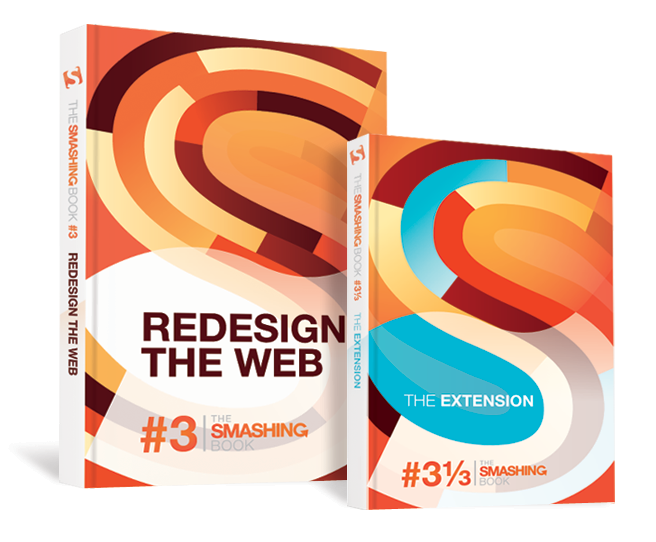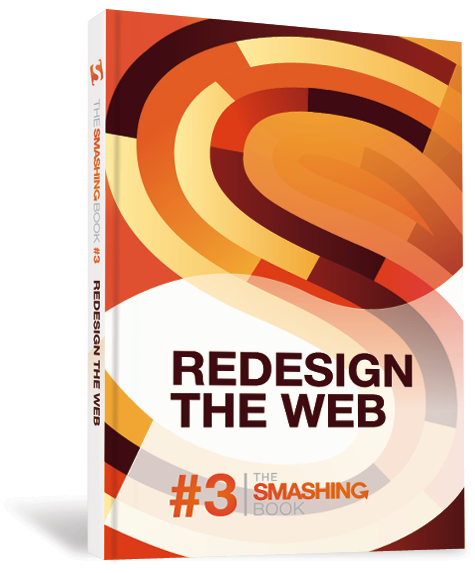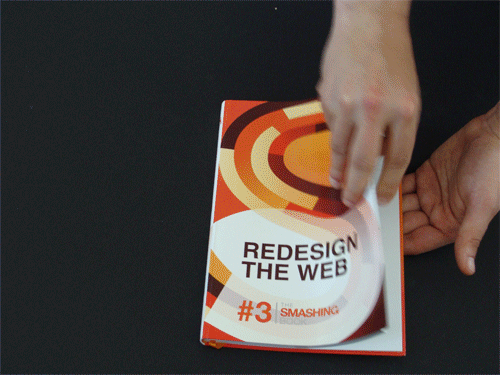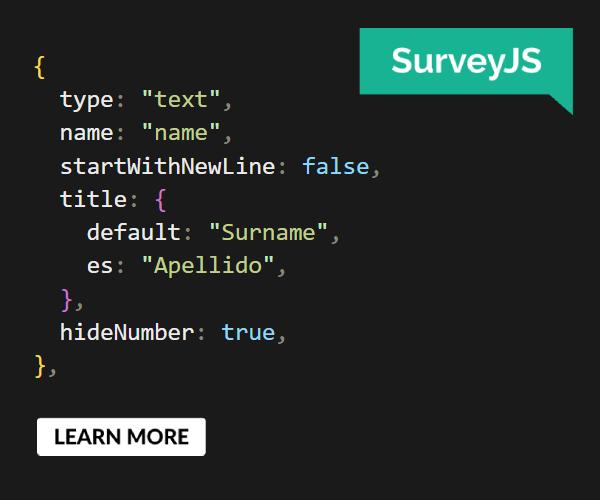The Smashing Book #3 “Redesign The Web” Is Out!
We believe this is by far the best book we’ve produced so far. We are very proud and excited, and the initial verdict has been thoroughly positive, yet in the end it’s up to you to decide how valuable and useful they really are. Get your books now! (free shipping worldwide)


Why The Theme Of “Redesign”?
In recent years, the Web has changed—a lot. The Web designer’s tools are now advanced, and browsers are highly capable. Designers have established clever coding and design techniques, and they face new challenges and are embracing new technologies. These changes are fundamental and require us to reconsider how we approach Web design. It’s time to rethink and reinvent: it is time to redesign the Web. The new Smashing books will change the way you design websites for the better.
But are we all prepared for this? How does responsive design fit into your workflow? What UX and mobile techniques do you follow when designing websites? And if you have a redesign project on the horizon, how do you approach it and work your way through it? The books explain what you need to know in order to create effective websites today, and what you need to know to be prepared for the future. Well-known experts share practical know-how and introduce a whole new mindset for progressive, future-proof Web design.
Smashing Book #3 (Print)

With over 40 people having worked on the project, a lot of thorough editing and consideration needed to be done to fine-tune each chapter’s content and order to make the most sense. In the end, 11 of the most outstanding articles made it into the Smashing Book #3, covering topics ranging from the business side of design to mobile approaches and responsive design.
The Smashing Book #3 covers innovative coding, design and UX techniques and discusses the peculiarities of the mobile context and emotional design. It also presents practical HTML5, CSS3 and JavaScript techniques, as well as a bulletproof workflow for responsive Web design. The book challenges you to think differently about your work, your code and your designs.
Table of Contents
| AUTHOR | CHAPTER | DETAILS |
|---|---|---|
| Elliot Jay Stocks | Preface | |
| Elliot Jay Stocks introduces the new Smashing Book #3 by making us think about our workflow, the quality of our work, our industry and our community. Working in an industry that evolves at an incredible speed takes a lot of effort—at the same time, it's what keeps us going. | ||
| Paul Boag | The Business Side of Redesign | |
| A redesign is the best thing that a Web designer can experience. Yet before leaping head on into a project, we must consider the business behind the redesign. By its nature, a redesign has the potential to make a website successful, but it also has the power to destroy a perfectly good idea. Important considerations to keep in mind before engaging in a redesign project include common dangers, required research, the working process with the client and testing. Paul Boag leads you through this process step by step.Chapter keywords: business model, redesign timing, scope of redesign, redesign considerations, realignment, project pitfalls. | ||
| Rachel Andrew | Selecting a Platform for Redesign | |
| Once you have understood the business side of the redesign project, the next step is to choose the right platform. Understanding all of the requirements of a project will save you valuable time in aligning the new functionality with the technological circumstances. Take stock of existing structures such as the CMS, e-commerce system and payment gateway. Beware of the project constraints, including the budget and wishes of the client. Only then will you be able to concentrate fully on the project, without encountering unpleasant surprises ahead.Chapter keywords: technical requirements, CMS, eCommerce, payment gateway, refactoring, platform choice, redesign project constraints. | ||
| Ben Schwarz | Jumping Into HTML5 | |
| Ben Schwarz takes away the fear that many Web developers suffer when confronted with a new technology—by encouraging experimentation. The chapter guides you through the new HTML5 elements and discusses the possibilities that come with the adaptation to these elements. This is a practical, compact guide to HTML5, with everything you need to know today in order to create flexible and maintainable websites for the future.Chapter keywords: HTML5, semantics, semantic outlining, ARIA, client-side storage. | ||
| Lea Verou, David Storey | Restyle, Recode, Reimagine With CSS3 | |
| Some CSS workarounds that have hung around from earlier days prevent us from becoming better, more efficient designers. Learn how to recode CSS to reduce the number of images, HTTP requests, presentational JavaScript and wrapper divs on the page, while making the style more flexible and maintainable. Learn about the rem unit, Flexible Box Layout, source-order independence with flex order, multiple backgrounds and gradients, background clipping, border images, transforms, transitions, box sizing and new CSS3 selectors. Restyle, recode, reimagine: because CSS3 is here to stay!Chapter keywords: CSS3, techniques, Flexbox, multiple backgrounds and gradients, transforms, transitions, box-sizing, selectors, layout. | ||
| Christian Heilmann | JavaScript Rediscovered | |
| Even though jQuery is written in JavaScript, it is not the same; nor is it native to browsers. The large jQuery library abstracts away a lot of issues that Web developers face, yet sometimes it's used without a real purpose. Christian Heilmann takes us back to its origins and shows us how to implement simple JavaScript solutions without resorting to jQuery, achieving the same result in a slimmer and less process-intensive way.Chapter keywords: JavaScript, jQuery, CSS selectors, classlist, localStorage, tutorials. | ||
| Dmitry Fadeyev | Techniques for Building Better User Experiences | |
| User experience means good design, and the central aim of design is not to decorate, but to solve problems. Whether that means getting more sign-ups, inviting users to post more content or making the interface easier and faster to use, this is ultimately the sort of design that delivers a great user experience. This chapter features powerful UX techniques that you can easily apply to your products and websites. Make sure users stay on your website for the right reasons, and get an edge over the competition by improving user-targeted processes. Also, explore experimental approaches and avoid some misleading design techniques.Chapter keywords: UX design, forms, good defaults, customer service, copywriting, storytelling, experimental techniques, design pitfalls. | ||
| Marc Edwards | Designing for The Future, Using Photoshop | |
| Because good design and user experience are almost mandatory for success today, the lines between desktop software, mobile software and the Web are increasingly blurry. We have to continually change our tools and techniques to meet new requirements. Marc Edwards addresses some of the challenges that Web designers face today and will in the future when using Photoshop. Realism, scale, screen sizes, resolutions, formats, techniques—this chapter touches on all of it. There is no reason to surrender to scaleability and liquid image requirements when using Photoshop!Chapter keywords: Photoshop, screen sizes, pixel density, scale, gradients, shapes, color profile, mobile, Retina display. | ||
| Aaron Walter | Redesigning With Personality | |
| Any design that does not effectively establish a connection with its audience has missed its goal. Getting to know your user is just as important as knowing yourself and the personality behind the brand; this will set you apart from competitors. This chapter describes how to develop your own design persona and define the key characteristics to guide your project’s path. New technologies and techniques are not what build connections with users, but rather the empathy evoked by the personality behind them. Aaron Walter explains how to bring out the personality at the heart of your work.Chapter keywords: personality, brand sympathy, engagement methods, design persona, voice and tone. | ||
| Aral Balkan | Mobile Considerations in UX Design: Web or Native? | |
| The native vs. Web debate is meaningless and counterproductive. All products nowadays have high demands for UX design. Web designers turn into UX designers by gaining specialized knowledge of the Web and by mastering auxiliary frameworks and their components. Not only do the aesthetics of an interaction object count, but also how the object behaves upon contact. Designing documents and designing applications requires knowledge of basic responsive design principles and progressive enhancement. This chapter helps you understand your medium, explains what exactly it means for an application to be “native,” and goes over how to choose the right tools and technologies for the job.Chapter keywords: mobile, user experience, native applications, native as culture, interaction design principles, responsive Web design. | ||
| Stephen Hay | Workflow Redesigned: A Future-Friendly Approach | |
| Web design changes quickly. In multiplatform design, where websites and apps are used on many and varied devices, we are confronted with multiple destinations. How do you go about integrating as many devices as possible? Is targeting as many different platforms as possible really important? In this chapter, Stephen Hay suggest a new design workflow for responsive Web design. A new way of thinking leads to a new way of design—the sooner you get the hang of it, the sooner you will be ready to discover what works best for your projects.Chapter keywords: responsive Web design, device-agnostic approach, content inventory, future-friendly approach, breakpoint graphing, designing in the browser. | ||
| Andy Clarke | Becoming Fabulously Flexible | |
| There are significant upsides to responsive Web design for designers, especially in workflows that embrace flexibility. Responsive Web design still asks more questions than it answers, and it challenges the working relationships and interactions between everyone involved in every process. Andy Clarke gives you some insight into the techniques that helped him become fabulously flexible when developing responsive designs. Learn his approach to designing atoms and elements of a design first and see if it works for you. It might enable you to create many facets of the same experience within a single workflow.Chapter keywords: Responsive Web design, design challenges, style tiles, design atmosphere, flexibility, designing components first. | ||
Well-respected professionals have poured their heart and expertise into these contributions. To ensure quality, every chapter of this book has been thoroughly reviewed by experts, including Jon Hicks, Tab Atkins, Paul Irish, Russ Weakley, Josh Clark, Anders M. Andersen, Bryan Rieger, Joshua Porter, Ryan Carson and Elliot Jay Stocks.
Technical Details
- 340 pages, 16.5 × 24.0 cm (6.5 × 9.5 inches).
- Download a free sample (.zip, in PDF, EPUB and Kindle)
- Quality flexibound cover, with stitched binding and a ribbon page marker.
- Delivery from Berlin, Germany, only via air mail (3 to 15 working days).
- $5 worldwide shipping (check worldwide delivery times).
- Also available as an eBook (PDF, EPUB, Kindle).
- Get your Smashing Book #3 today!
Smashing Book #3⅓ — The Extension

With Web design, we can do much more than inform the audience. The power of storytelling and content strategy is in creating engaging, emotional connections that transcend their platform. In this book, we will review emerging navigation design patterns and understand how to employ a content strategy—which is an important process, often underestimated, and dependent on many factors.
Smashing Book 3⅓, otherwise known as “The Extension,” presents practical applications of storytelling to Web design, reviews emerging navigation design patterns and helps you understand how to meaningfully employ content strategy on your websites. A case study of Smashing Magazine’s responsive redesign illustrates how this approach could look like in practice.
Table of Contents
| AUTHOR | CHAPTER | DETAILS |
|---|---|---|
| Iris Lješnjanin | Preface | |
| The Smashing Book #3 was limited to a certain size and format, making it impossible to include all of the chapters without compromising the book’s overall integrity. The Smashing Book #3⅓ is a challenge: explore the possibilities that modern technology and our design legacy have in store for us Web designers. | ||
| Denise Jacobs | The Missing Element of Redesign: Story | |
| Today's Web audience is on the search for more than just information. Consumers expect to be engaged and want to be drawn in by a website, one that makes them feel something and manages to inspire. While changing the look and feel of a website used to be somewhat easy, it is time to reconsider the fundamentals of our approach to a redesign. Learn how to successfully capture attention by using copywriting and storytelling, and understand the important relationship between emotion, design and story.Chapter keywords: storytelling, invisible design, literature, narrative devices. | ||
| Christian Holst and Jamie Appleseed | Rethinking Navigation: Techniques and Design Patterns | |
| Navigation is what lends a page interactivity, connecting otherwise isolated pages into a logical order. Still, its design must fit the content and purpose of the website, not the other way around. Organic content calls for new and adaptive navigational elements. But how do we go about that? This chapter gives you useful insight into rethinking your approach to navigation.Chapter keywords: navigation, design patterns, filtering, mega menus, checklist. | ||
| Colleen Jones | Rework Your Content So It Works for You | |
| If you invest much time and effort in the design of your website, but not the content, you’re taking a big risk. Don’t disappoint your users with the same old content after raising expectations with an impressive design. This chapter takes a strategic approach to content and explains the basics of formulating the right content strategy for your website redesign.Chapter keywords: content strategy, content inventory, audit, context, maintenance, results assessment. | ||
| Vitaly Friedman | Responsive Smashing Redesign: A Case Study | |
| Redesigns usually introduce unexpected changes and are rarely applauded; moreover, a large-scale redesign is a tough and risky game to play. Smashing Magazine faced a long list of technical and UX changes in July 2011, and the team decided to act. This chapter presents a detailed case study of the whole redesign process, from A to Z, as it happened, and it sheds some light on the design, UX and technical considerations that actually led to the redesign.Chapter keywords: redesign trap, responsive Web design, advertising constraints, design persona, typography-out approach, designing in the browser, redesign manifesto. | ||
Technical Details
- 160 pages, 14.0 × 21.0 cm (5.5 × 8.3 inches).
- Quality flexibound cover, with stitched binding and a ribbon page marker.
- Delivery from Freiburg, Germany, only via air mail (3 to 15 working days).
- Free worldwide shipping. (Check worldwide delivery times.)
- Also available as an eBook (PDF, EPUB, Kindle).


Cover Design by Veerle Pieters
The Smashing Book series has gotten a rather eye-catching facelift. The well-respected Belgian artist Veerle Pieters has taken on the significant task of putting together an innovative, bold cover design. And the result is bold indeed. Veerle’s styling of Smashing Magazine’s “S” reflects the many aspects that make up a Web designer’s workflow today.


Exclusive Artwork by Kate McLelland
If you have the Smashing Book 2, you’ll know that animals play a distinct role—forming almost a tradition for the series. This time, we have asked the talented young illustrator Kate McLelland to illustrate the introductory pages for all of the chapters. Kate has been impressively creative in her designs; the theme of redesign has obviously shaped the tone of her artwork. Each chapter begins with an elaborate drop cap.


Each illustration employs a different metaphor that relates to the accompanying chapter. See what they all are once you get your hands on the book. Appropriately enough, when strung together, the drop caps spell out “Redesign the Web.” The composite style of the illustrations points to how so many components have to come together for a successful redesign.
Reviews and Testimonials
We’re looking forward to honest, objective reviews of the brand new Smashing Books. Please share your photos, opinions and feedback on Twitter using the hashtag #smbook3. The first feedback has been throughout positive and, in fact, we’ve discovered the first reviews of the books as well:
"The entire book is wonderfully balanced between theoretical and practical, with each author contributing a strong point of view on their area of expertise as well as a thorough explanation of how to execute it in a way that is useful. [...] curating the most cutting edge perspectives on the Web and offering the tools and information that the rest of us need to build upon them. If you're into that, check out this book."— Christopher Butler, Book Review: Smashing Book #3
"This book is worth buying and reading for yourself. It really covers many aspects of modern website production in eleven in-depth chapters. There will likely be a few you don’t care for—we all have our own tastes—but I’d be surprised if any genuinely leave you disappointed given the chance. I was quite prepared to write something less positive, the first Smashing Book didn’t excite me, but this one very much did."— David Bushell, Smashing Book #3
"The Smashing Book #3 is an invaluable resource for Web designers, regardless of skill level or experience and we highly recommend it."— Cameron Chapman, Review: Smashing Book #3
"[...] not only is this a good book and an enjoyable read, but it is an important book that really can change the way we design, or redesign, for the Web."— Jeremy Girard, Reviewing The Smashing Book #3
Please feel free to submit a link to your review in the comments to the post and we’ll add your testimonial into this article. Feel free to provide criticism or praise: we’d love to hear your honest opinions!

Frequently Asked Questions (FAQ)
We want to make it as easy as possible for everyone to buy the new Smashing Book. We welcome all suggestions and advice that could improve Smashing Magazine’s user-friendliness. Here are answers to some frequently asked questions about the Smashing Books #3 and #3 1⁄3:
| Questions |
|---|
| What’s the difference between Smashing Books 1, 2 and 3? |
| The first two books covered best practices in modern Web design. Although they had similarities, the two books covered different areas of Web design. Smashing Book #3 has a particular theme: redesign. It covers the redesign process per se, as well as cutting-edge approaches to Web design on a broader scale. It focuses on the most recent developments and current demands of today’s rapidly changing environment. Smashing Book #3 gives professional advice on the what, when and how of responsive and bulletproof Web design, according to the requirements of today’s Web. |
| What’s this extra Smashing Book #3⅓? |
| Our authors have turned out to be much more productive than we anticipated, coming up with more exciting chapters than one book could handle. Adding these chapters to the book would have increased the size and weight—and, hence, shipping cost—substantially. Not wanting to withhold these chapters, we have decided to release them separately. We are proud to present the Smashing Book #3⅓: The Extension, four extra chapters of quick quality reading. Buy it as part of a bundle and save! |
| Will the book be available in other languages? |
| Maybe in future, but we have not made arrangements for that yet, so don’t hold your breath. |
| Are the Smashing Books #3 and #3⅓ available as eBooks? |
| Yes, the books are available in PDF, EPUB and Mobipocket formats, and you can order an eBook bundle right now. |
| What are the costs for shipping to my country? |
| The shipping cost for one book or a bundle is free—wherever you are in the world. We are paying the shipping costs ourselves to make it possible for anyone to purchase the book. We don’t have any hidden costs, and we won’t confuse you with tricky calculations. |
| How long will delivery take to my country? |
| All books are shipped via air mail to keep delivery times as short as possible. You can find the anticipated delivery time for your country in the delivery times overview. |
| What payment methods are accepted? |
| We accept PayPal, VISA, MasterCard and American Express. We use a secure connection, with 256-bit AES encryption and a green GeoTrust Extended Validation SSL CA certificate. |
| Is there a money-back guarantee? | Yes, absolutely! No risk is involved. Our 100-day full money-back guarantee keeps you safe. Don’t hesitate to return your purchase. You’ll get your money back—no ifs, ands or buts about it. |
| I have a question that is not covered here. |
| Please leave a comment below, or get in touch with us via the contact form or via @SmashingSupport on Twitter. We would love to help you in any way we can! |
Please Spread The Word!
These new books took seven months of production time, from brainstorming to delivery; 43 people worked on the content, design, layout, editing and proofreading of the book; 623 animals are hidden in various places in the Smashing Book #3; and the production costs for initial circulation, excluding marketing costs, required a six-figure budget. That’s what it took us to ensure that our Berlin warehouses are stocked with these new valuable books, waiting to be shipped right away as soon as you place your order.
Here at Smashing Magazine, we do our best to support and enrich the design community. Yet we also rely heavily on community opinion—in fact, the magazine would not be what it is today without the constant feedback of the community. That’s where you come in: we now pass the book onto you. Use it, enjoy it, test it, read it, rate it, evaluate it, criticize it or praise it—and share your honest opinion of it with the rest of the world.
Feel free to take as many pictures of it as you like and to use the Smashing Book #3 media kit (.zip, 9 Mb), which is full of interesting facts, figures and images related to the book. Be one of the first to give the community a critical view of the book; stir the discussion, and encourage feedback on your website.
Your criticism helps us further improve future projects, shapes the selection of topics and enables us to stay close to the pulse of the community. We sincerely appreciate your support.




 Celebrating 10 million developers
Celebrating 10 million developers
 SurveyJS: White-Label Survey Solution for Your JS App
SurveyJS: White-Label Survey Solution for Your JS App Register for free to attend Axe-con
Register for free to attend Axe-con



